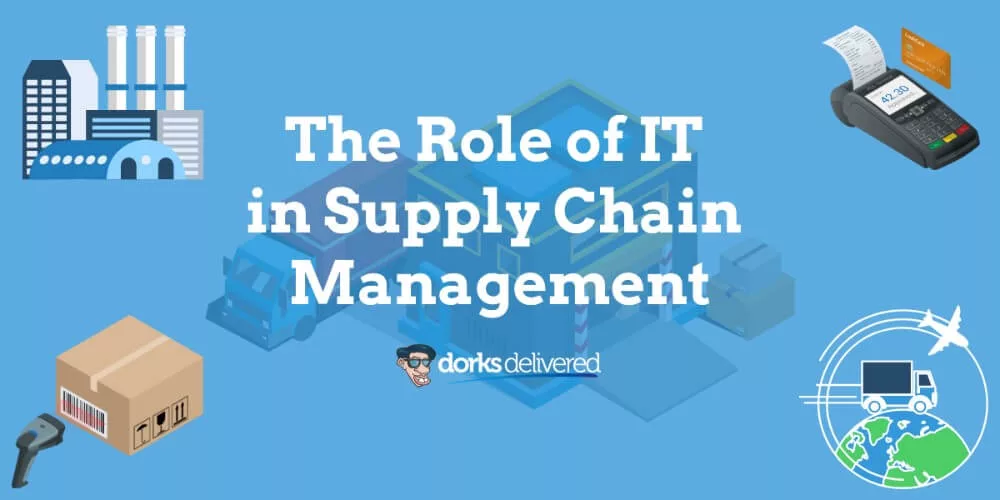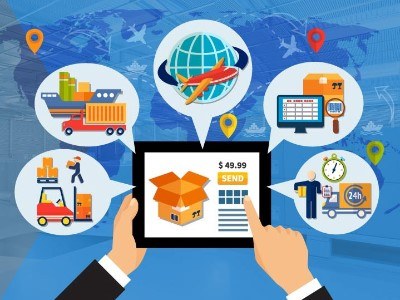Companies face several challenges wherever they are in the supply chain. Utilizing information technology, businesses can deal with various supply chain management issues.
What is a supply chain?
A supply chain refers to the entire process of making and selling goods, from the supply of raw materials and using them to manufacture products to the distribution and sale to consumers. It is a network of companies, including suppliers, manufacturers, shippers, distributors and retailers, working together to make stuff like logistics, inventory management, transportation and so forth go as smoothly as possible.
What is the role of IT in supply chain management?

Real-time or almost real-time information is the key to proper supply chain management. With information about the various stages of the supply chain, decision-makers can plan, manage, and adjust processes to achieve goals in procurement, inventory, manufacturing, etc.
Why is technology important in supply chain management?
Business processes have been digitalized in the past couple of decades, and it has become a necessity rather than an option. Why not? IT integrates various operations carried out by different companies in the supply chain. It speeds up the business processes and prevents bottlenecks. Companies are closer to achieving on-time procurement, shorter inventory, and better efficiency, especially in manufacturing. IT allows companies in the supply chain to meet the needs of consumers.
How does information technology affect supply chain management?
Supply chain management is all about producing the right product in the right quantity and sending them to the right place at the right time. It seems simple, but it can quickly become complicated.
How Suppliers Can Utilize Information Technology
The supply chain starts with the supplies. With a reliable supply chain software that allows real-time information sharing, manufacturers and suppliers can collaborate better and avoid production delays due to insufficient raw materials.
Normally, manufacturers initiate transactions with suppliers but if you are a supplier, you can monitor your clients’ inventory, forecast future demands, and make sure that you’re ready to fulfil orders for raw materials. Suppliers can also use historical data to make informed decisions in aspects like partnership and contract management.
Be the most reliable supplier in your area! Take advantage of the latest technology for supply chain management.
How Manufacturers Benefit From IT
IT offers better visibility and transparency that lead to better accountability and control over the production of goods. Manufacturers that have clear visibility on production can make adjustments to make the process more efficient as well as foresee problems and prevent them. For example, with IT, a manufacturer can foresee delays and make changes in the production schedule.
How Information Technology Helps Shippers
Timely delivery is essential in any industry. Delivery that’s done on time usually results in customer satisfaction, and customer satisfaction normally leads to customer retention.
As a shipper or logistics provider, you can ensure customer satisfaction by improving order tracking and delivery. Keeping the manufacturers and distributors informed of the entire delivery process and possible delays already puts you a step closer to repeat business. What more if you can avoid delays by utilizing data from the tools? Many supply chain management tools for delivery and shipping service providers also let you give clients access to a platform where they can enjoy a sense of control.
Utilize the best supply chain management tools to keep your clients satisfied.
How Distributors Can Take Advantage of IT
Distributors that are spending a lot of time and wasting money on inventory management can rely on supply chain management tools for some badly needed assistance. With the right tool and documented process, distributors no longer have to worry about excess or insufficient stock. Instead, they can predict demands and effectively manage inventory and orders.
How Retailers Can Use Information Technology
In the supply chain, retailers are the ones who face consumers. They need flexibility and visibility as well as integration. Retailers can integrate their POS systems, which capture their sales, with their tool for monitoring the stock level, which is also visible to the distributor. Retailers can also set a reorder point that when reached will automatically generate an order.
Predict demands and manage orders effectively. Get the most reliable supply chain tools for sales and orders.
The Role of IT in Supply Chain Management
IT is leaving a mark everywhere. Nothing remains untouched. No wonder every aspect of a business is now under its command! The role of IT in Supply Chain Management is highlighted in the following points.
1. Integrated and Coordinated Supply Chain
A supply chain can only work efficiently when it is properly integrated and well-coordinated. IT performs this crucial task by bringing in multiple technologies and combining them to optimise the supply chain. These technologies make data collection possible and much easier and more accurate. In turn, this allows precise and detailed data analysis leading to sound business decisions.
 2. Increased Productivity
2. Increased Productivity
Smooth flow of information, new technologies and effective communication increase the productivity of all entities in the supply chain. It is like a trigger for product movement. Instead of going back and forth, IT provides the link that passes the needed information continuously.
3. Cost Reduction
IT permits optimum utilisation of resources and assets. Old data is used to study the trends, and technology is used to analyse it for improving performance. When resources are used optimally, they result in cost reduction.
In a supply chain, the role of IT becomes more prominent because it motivates all parties to use their respective resources in the most cost-efficient manner. When IT is used as it should be, there is a dramatic fall in overall expenses.
4. Product Improvement
IT consists of tools and applications which can be used to gain early awareness. In a market where consumers always want something new, the product will either have to evolve or it will go out of demand. To stay in business, you must introduce product improvement and innovation sooner rather than later. The kind and extent of product improvement can be validated with the help of IT.
5. Supply Chain Visibility
Information makes the entire supply chain visible to supply chain managers. The manner in which the information flows from one collaborator to the other and the impact it has on others is used by the managers in making strategic decisions.
The Functional Roles of IT in Supply Chain Management
Apart from the above-mentioned basic roles, there are three functional roles of IT in supply chain management. These are:
1. Transaction Execution
When information flows efficiently between the participants of the supply chain, the number of transactions between them is reduced. IT increases the efficiency of repetitive data exchanges. This data is usually appropriate for delivery verification, order processing, billing, and dispatch advice.
2. Collaboration and Coordination
IT renders the flow of information. This makes for easier planning, coordination and improved collaboration between all participants. Demand forecasts make it possible to plan for the future, and order tracking makes knowing the physical location of each order a reality. Neither of these activities is possible without IT.
3. Decision Support
Good decisions cannot be pulled out of thin air. They are and should be based on data. IT is a huge benefit in decision support. It can collect even the most complicated set of data and convert it to easy-to-understand charts and reports. In this context, IT extends decision support to all managers.
Enjoy smooth transaction, efficient execution, and better collaboration whether you’re on the upstream or downstream of the supply chain.
Software for Supply Chain Management
There are many tools that are used for effective supply chain management. These are primarily categorised as:
1. Enterprise Resource Planning
Materials requirement planning, which was earlier used to distribute resources for a manufacturing operation, resulted in enterprise resource planning (ERP), a system that links individual IT applications into a single one. This results in the integration of the data and the processes of the complete business.
When all operations are consolidated, information related to cash flow and material flow starts making more sense. ERP has now become the backbone of the supply chain and provides an integrated view of the organisation as a whole. Today, ERP has also led to the automation of many functions so that there is minimal human intervention.
2. Electronic Data Interchange
Electronic Data Interchange (EDI) is the exchange of business data from one computer to another. It is usually done in a standard format so that all concerned parties can use it according to their need without having to constantly ask for it. EDI allows companies, across the industry, to communicate with one another.
Everyone who uses EDI follows the same rules and methods. This makes for efficient inventory management, better business relationships, and improved customer service.
3. Supply Chain Management Systems
An ideal supply chain management system will help in planning, selecting the vendor, manufacturing, logistics, and building the customer relationship. To provide the necessary assistance Supply Chain Planning (SCP) software and Supply Chain Execution (SCE) software are used.
4. Customer Relationship Management
CRM or e-CRM uses IT to assist an e-business in managing its customer base. It matches customer needs with the product plans to increase sales.
The Final Word
The secret behind successful Supply Chain Management lies in IT. From the very beginning of the supply chain to its very end, data plays a key role in bringing the entire set together. IT tools provide the necessary communication link between all entities and allow them to work independently and yet in a coordinated manner. The role of IT in supply chain management is undeniable. It is the chain that binds everyone and everything together. It is vital!
Editor’s Note: This article was originally published on 28th January 2019. It has been revamped and updated to provide more information and to reflect recent trends.
Do you need reliable monitoring tools and tracking systems for your business? Contact us for custom tech solutions starting at $1.
[module-379]






























